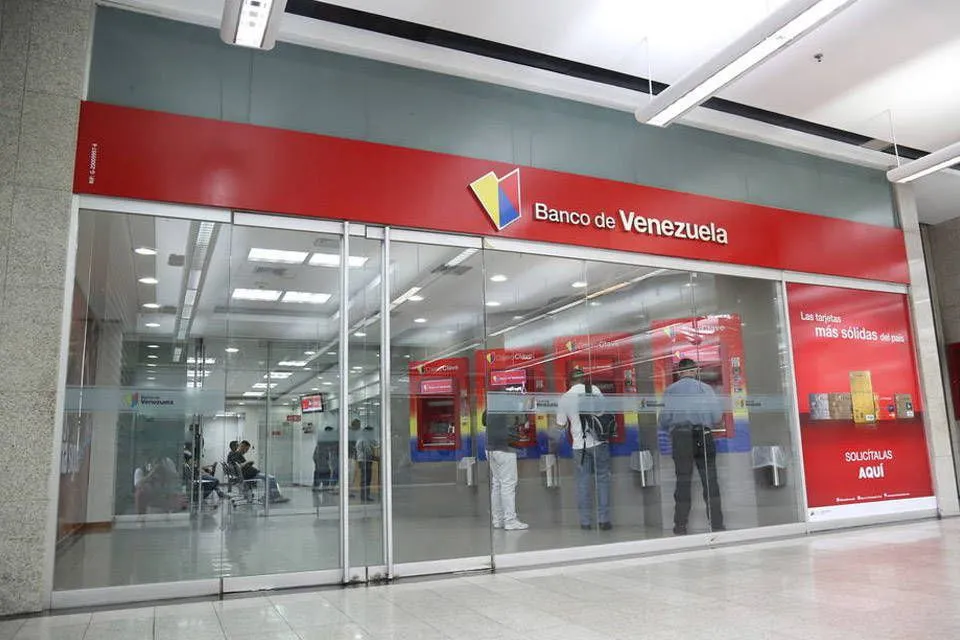
Un banco no es más que una empresa que desarrolla una actividad económica, en este caso: "intermediación financiera", que consiste en captar recursos monetarios del público en forma de depósitos bancarios que realizan sus clientes en las cuentas que han abierto en el banco (pasivos), y una vez recibido estos depósitos, el banco los utiliza para otorgar un créditos o financiamiento a otro cliente que lo requiera para sus actividades productivas e incluso para el consumo (activos). Al otorgar un crédito, el banco crea nuevos bolivares que entran en circulación en la economía aumentando la masa monetaria, el banco asume un riesgo, pues existe la posibilidad que quien reciba el crédito no pueda pagarlo, y por asumir ese riesgo, el banco tiene licencia de estado para cobrar una tasa de interés a quien recibe el crédito y con ese ingreso producto de la tasa de interés, el banco podrá pagar sus costos operativos y generar una utilidad.
! [English version here] Banco de Venezuela is the largest financial institution in the country, it currently holds 52.5% of the assets of the entire banking system, and although this rises or falls every month, during the last year it has remained above 50%, and its current value is 5,831.87 million dollars.
A bank is just a company that carries out an economic activity, in this case: financial intermediation, and consists of capturing monetary resources from the public in the form of bank deposits made by its clients in the accounts they have opened in the bank (liabilities), and once these deposits are received, the bank uses them to grant a credit or financing to another client who requires it for his productive activities and even for consumption (assets). By granting a loan, the bank creates new bolivars that enter into circulation in the economy increasing the monetary mass, the bank assumes a risk, since there is a possibility that whoever receives the loan will not be able to pay it, and by assuming this risk, the bank is licensed by the state to charge an interest rate to whoever receives the loan and with this income from the interest rate, the bank will be able to pay its operating costs and generate a profit.
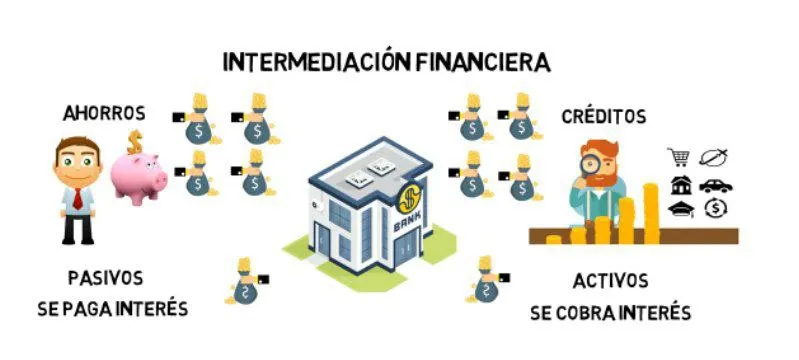
Los ingresos que obtienen los bancos por concepto de intereses sobre créditos y financiamientos se denominan "ingresos financieros" pero los bancos también prestan distintos servicios a sus clientes como transferencias entre cuentas del mismo banco, transferencias interbancarias, pagos electrónicos a través de tarjetas de débito y crédito, transferencias interbancarias inmediatas (pagomovil) y un sinfín más de servicios que generan comisiones que serán sumadas a los ingresos del banco que son denomidadas "ingresos operativos".
Como toda empresa se construye con el objetivo de generar utilidades para sus dueños (accionistas), cada banco debe ser lo más eficiente posible para generar ingresos y que sus costos y gastos sean lo más bajo posible de forma que al final de la ecuación ingresos - egresos, sea positiva.
Al final de cada ejercicio económico fiscal de una empresa, su junta directiva convoca una asamblea ordinaria de accionistas (AODA) para dar parte a éstos sobre lo ocurrido durante el ejercicio económico fiscal que acaba de terminar a través de la lectura los balances y estados financieros, que los accionistas deben aprobar basados en auditorías tanto internas como externas. En las AODA, También se toman decisiones de alto nivel relativas a el funcionamiento y rumbo a futuro de cada empresa, se elige los miembros de la junta directiva, los comisarios, sus salarios y remuneraciones, se modifican estatutos del acta constitutiva y todo aquello que se requiera para adaptar la empresa ante el cambiante escenario del país donde se encuentre, y por último pero no menos importante, se toman las decisiones sobre el destino de los excedentes o utilidad que ha logrado la empresa en el ejercicio económico fiscal que se esté abordando.
! [english version here] The income that banks obtain from interest on loans and financing is called “financial income”, but banks also provide different services to their clients such as transfers between accounts of the same bank, interbank transfers, electronic payments through debit and credit cards, immediate interbank transfers (pagomovil) and an endless number of other services that generate commissions that will be added to the bank's income, which are called “operating income”.
As every company is built with the objective of generating profits for its owners (shareholders), each bank must be as efficient as possible to generate income and that its costs and expenses are as low as possible so that at the end of the income - expense equation, it is positive.
At the end of each fiscal year, a company's board of directors convenes an ordinary shareholders' meeting (AODA) to report to the shareholders on what happened during the fiscal year just ended by reading the balance sheets and financial statements, which the shareholders must approve based on both internal and external audits. In the AODA, high-level decisions are also taken regarding the operation and future course of each company, the members of the board of directors, the commissioners, their salaries and remunerations are elected, the bylaws of the articles of incorporation are modified and all that is required to adapt the company to the changing scenario of the country where it is located, and last but not least, decisions are taken on the destination of the surpluses or profits that the company has achieved in the fiscal year being addressed.
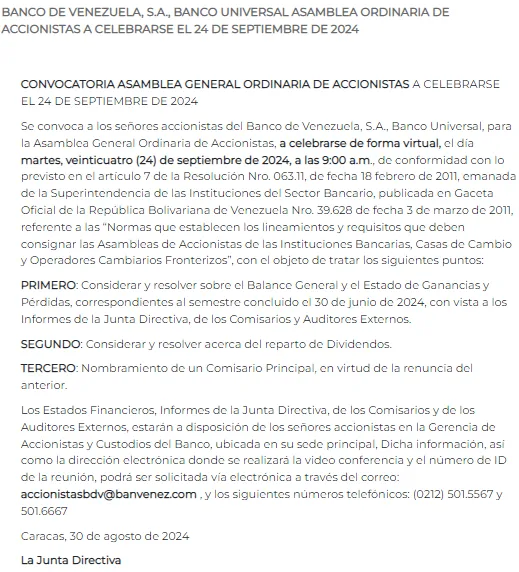
El pasado 24 de septiembre del presente año se celebró la asamblea ordinaria de accionistas del Banco de Venezuela S.A y después de mostrar los logros obtenidos por el banco durante el primer semestre del año 2024, entre los que se encuentran un aumento del 50.7% en las captaciones del público manteniendo así su liderazgo en ese indicador bancario, y gracias a ese aumento en los depósitos se logro incrementar en 71.8% su cartera de crédito logrando también el 1er lugar en todo el sistema financiero en cuanto al tamaño de la cartera de crédito y de acuerdo a la normativa, el 79% de toda la cartera de credito está destinada al sector productivo del país y con un riesgo crediticio increíblemente bajo con una morosidad inferior al 1%.
En cuanto al patrimonio, mantiene el primer lugar con una cuota de 59% del patrimonio total de todo el sistema financiero convirtiéndolo así en un titán muy difícil de igualar, y esto se traduce en ingresos que le otorga una utilidad de 5.40 millones de bolívares equivalentes a 148.6 millones de dólares siendo la institución bancaria más rentable del sistema financiero venezolano.
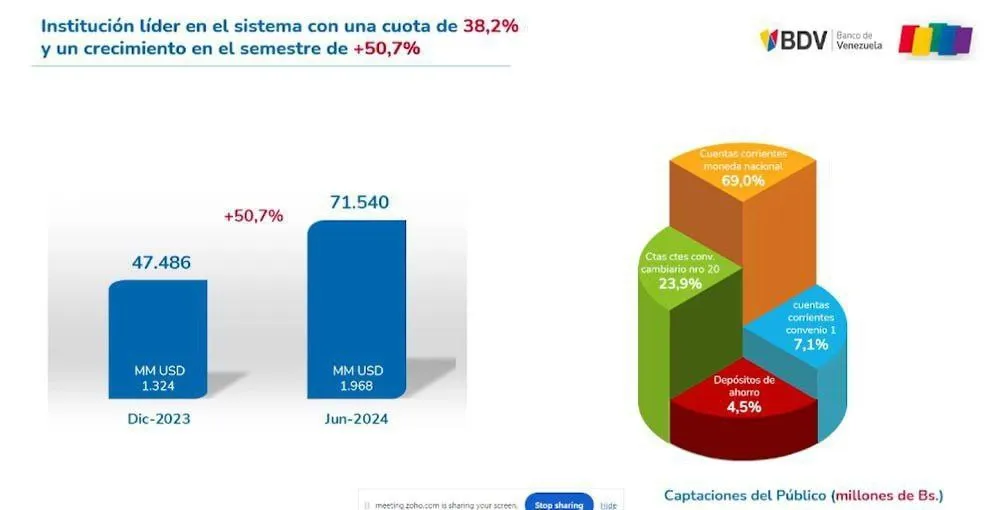
! [english version here] On September 24 of this year, the ordinary shareholders' meeting of Banco de Venezuela S.A. was held and after showing the achievements obtained by the bank during the first semester of the year 2024, among which are an increase of 50.7% in deposits from the public, thus maintaining its leadership in this banking indicator, and thanks to this increase in deposits, an increase of 71.8% in its loan portfolio was achieved. In accordance with the regulations, 79% of the entire loan portfolio is destined to the productive sector of the country and with an incredibly low credit risk with a delinquency rate of less than 1%.
In terms of equity, it maintains first place with a market share of 59% of the total equity of the entire financial system, making it a titan that is very difficult to match, which translates into income that gives it a profit of 5.40 million bolivars equivalent to 148.6 million dollars, making it the most profitable banking institution in the Venezuelan financial system.
Nada mal para un banco controlado por el estado donde la regla es que no funcione o su eficiencia sea negativa
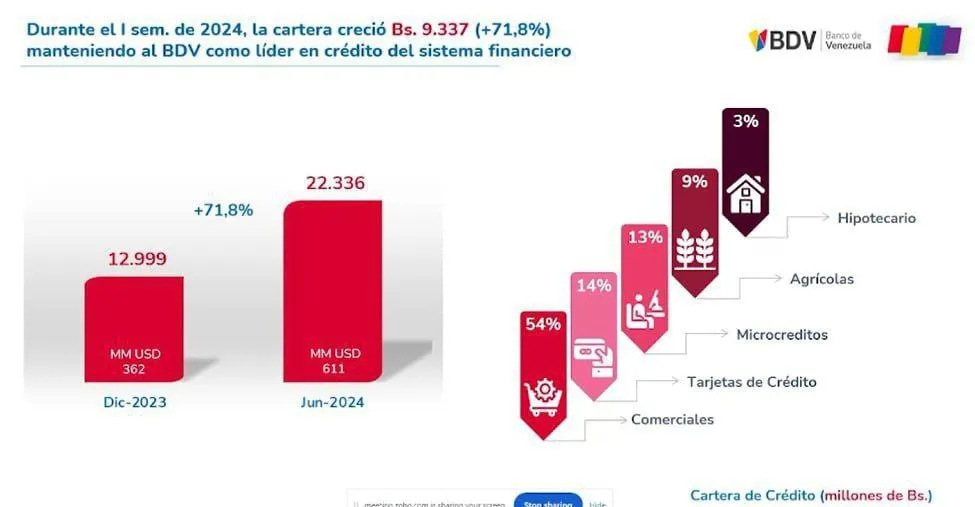
Esta utilidad se utiliza para realizar las las adecuaciones, apartados y reservas de ley para cumplir compromisos ante posibles pérdidas patrimoniales y aún así lograr un excedente de 2.446 Millones de Bs equivalente a 66 Millones de US$, que fue el monto cuya propuesta de la junta directiva realizó para repartir entre todos sus accionistas en forma de dividendos
Esta propuesta fue aprobada en la asamblea, y se otorgó a la junta directiva poder para ejecutar los actos materiales necesarios y establecidos en la ley para hacer efectivo este dividendo. Recordemos que los dividendos es la parte de la utilidad o ganancias que obtiene una empresa que se reparten a los accionistas después de cubrir todos sus compromisos, reservas, apartados para inversiones y adecuaciones, etc. Por lo que para que una empresa pueda otorgar dividendos, ésta primero debe obtener ganancias de sus actividades económicas y pagar con esas ganancias todos sus compromisos, en caso de haber un excedente después de pagar todo esto, son esos excedentes los que se podrían tomar como propuesta para ser otorgados en forma de dividendos.
! [Hidden Spoiler Text] In terms of equity, it maintains first place with a market share of 59% of the total equity of the entire financial system, making it a titan that is very difficult to match, which translates into income that gives it a profit of 5.40 million bolivars equivalent to 148.6 million dollars, making it the most profitable banking institution in the Venezuelan financial system.
This profit is used to make the necessary adjustments and reserves required by law to meet commitments in the event of possible losses and still achieve a surplus of Bs 2,446 million, which was the amount proposed by the board of directors to be distributed among all its shareholders in the form of dividends.
This proposal was approved at the meeting, and the board of directors was granted the power to execute the material acts necessary and established by law to make this dividend effective. Let's remember that dividends are the part of the profit or earnings obtained by a company that are distributed to the shareholders after covering all its commitments, reserves, investment and adjustment reserves, etc. Therefore, in order for a company to be able to grant dividends, it must first obtain profits from its economic activities and pay with those profits all its commitments, in case there is a surplus after paying all this, it is those surpluses that could be taken as a proposal to be granted in the form of dividends.
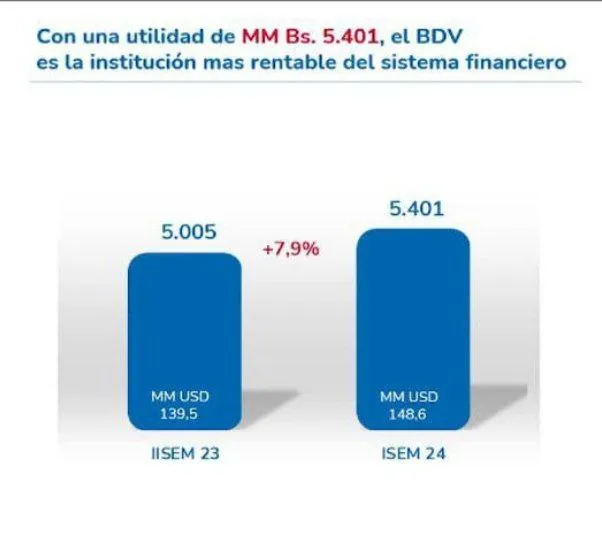
Este dividendo será pagado a través de transferencia bancaria el próximo jueves 10 de octubre a cada uno de los accionistas que estén debidamente registrados en el libro de accionista para el día lunes 7 de octubre, es decir, todo aquel inversionista que haya comprado acciones hasta el día jueves 3 de octubre, ya que en el mercado bursátil, el tiempo de liquidación de las operaciones es de 2 días hábiles bancarios.
De cuánto será mi dividendo por ser accionista del banco?
Ya sabemos que el monto total del dividendo es de 66 millones de dólares (2.446.442.361,79 Bs), los dividendos son repartidos de forma proporcional de acuerdo a la propiedad que cada accionista tenga del banco, si una persona es propietaria del 1% de las acciones en circulación, posee el derecho de recibir el 1% del total a repartir, evidentemente para lograr tener la propiedad del 1% de las acciones en circulación, se requiere tener un capital cuantioso para hacerlo en una sola compra o ir comprando de forma periódica de acuerdo a los ingresos que se tengan, pequeñas cantidades de acciones hasta lograr obtener el porcentaje accionario que se desea de esa empresa.
El monto del dividendo a recibir por acción será de 0,67078 Bs, lo que quiere decir que si para el día 7 de octubre una persona tiene en su portafolio 1.000 (mil) acciones del banco, recibira 670,78 Bs en su cuenta bancaria el próximo jueves 10 de octubre.
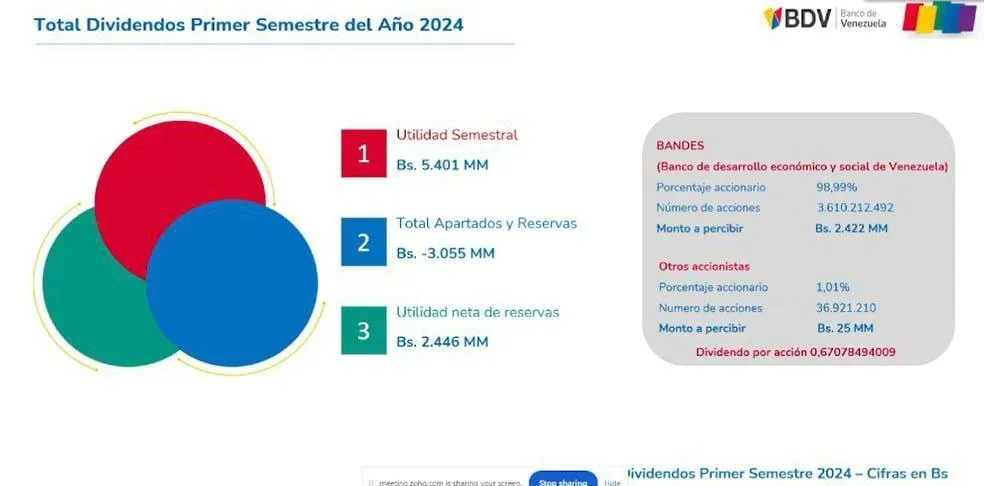
Eres tu accionista de este banco? Cuántas acciones has logrado adquirir hasta este momento? Uno de los objetivos de ser inversionista es recibir ingresos en nuestra cuenta bancaria que no dependan de nuestro trabajo en forma de renta o dividendos como el que se otorgará este próximo jueves 10 de octubre, si aún no eres propietario de ninguna acción de este banco, puedes comenzar a utilizar parte de los ingresos que obtienes gracias a tu trabajo para comprar acciones cada vez que recibes tu salario, aunque en esta oportunidad ya no tendrías tiempo de entrar en la lista de quienes sí percibiremos una tajada de esa ganancia, si comienzas desde hoy, en el próximo pago de dividendos que será dentro de 6 meses ya podrás comenzar a saborear el fruto de no gastar todo lo que te ganas sino construir y alimentar tu portafolio de inversión.
Si ya tienes algunas acciones de este banco, mi sugerencia es que utilices esos bolívares que recibirás como dividendos para comprar más acciones del mismo banco y de esa manera se incrementará el número de acciones que ya tienes actualmente sin tener que haberlas pagado de tu bolsillo ya que la habrás pagado con la misma ganancia que ya te está generando ser accionista del banco, es lo que le llamamos interés compuesto y de esta manera tu portafolio de inversión crecerá ahora con dos fuentes de ingreso y no solo con lo que decidas utilizar de tu salario. El portafolio crecerá mucho más rápido si lo alimentas con dos fuentes y no con una.
No sabes cómo comprar acciones de este banco?
Es sumamente fácil y sencillo ya que sus acciones están inscritas en la pizarra de cotizaciones de la bolsa de valores de Caracas y no hay que ser rico ni millonario para acceder a la bolsa, pues hoy 9/Octubre el precio de las acciones del banco de Venezuela es de apenas 15,35 Bs, es decir, lo que cuesta un pasaje de autobús en Venezuela, y si quieres aprender a comprar acciones no solo de este banco sino de los otros que también están inscritos en la bolsa de valores de Caracas y de otras empresas de las más grandes y reconocidas del país, no dudes en contactarme para guiarte en el camino paso a paso desde cero para convertirte en un inversionista en el mejor país del mundo: Venezuela
! [english version here] This dividend will be paid by bank transfer on Thursday, October 10 to each of the shareholders who are duly registered in the shareholder's book by Monday, October 7. This means that all investors who have purchased shares by Thursday, October 3, will be able to do so, since the stock market has a settlement time of 2 banking days.
How much will my dividend be for being a shareholder of the bank?
We already know that the total amount of the dividend is 66 million dollars, the dividends are distributed proportionally according to the ownership that each shareholder has of the bank, if a person owns 1% of the outstanding shares, he/she has the right to receive 1% of the total to be distributed, evidently to achieve the ownership of 1% of the outstanding shares, it is required to have a large capital to do it in a single purchase or to go buying periodically according to the income that one has, small amounts of shares until obtaining the shareholding percentage of that company.
The amount of the dividend to be received per share will be 0.67078 bolivars, which means that if on October 7 a person has in his portfolio 1000 (one thousand) shares of the bank, he will receive 670.78 bolivars in his bank account on October 10.
Are you a shareholder of this bank? How many shares have you managed to acquire so far? One of the objectives of being an investor is to receive income in our bank account that does not depend on our work in the form of income or dividends as the one that will be granted this coming Thursday October 10, if you still do not own any shares of this bank, you can start using part of the income you get from your work to buy shares every time you receive your salary, although this time you would not have time to enter the list of those who will receive a slice of that profit, if you start today, in the next dividend payment that will be in 6 months you can begin to savor the fruit of not spending everything you earn but build and feed your investment portfolio.
If you already have some shares of this bank, my suggestion is that you use those bolivars that you will receive as dividends to buy more shares of the same bank and in this way you will increase the number of shares you already have without having to pay for them out of your pocket since you will have paid for them with the same profit that being a shareholder of the bank is already generating, this is what we call compound interest and in this way your investment portfolio will grow now with two sources of income and not only with what you decide to use from your salary. The portfolio will grow much faster if you feed it with 2 sources and not with one.
Don't know how to buy shares of this bank?
It is extremely easy and simple since its shares are listed on the Caracas Stock Exchange and you do not have to be rich or a millionaire to access the stock market, because today 9/October the price of the shares of the bank of Venezuela is only 15.35 Bs, that is, what a bus ticket costs in Venezuela, and if you want to learn how to buy shares not only of this bank but of others that are also registered in the Caracas stock exchange and other companies of the largest and most recognized in the country, do not hesitate to contact me to guide you on the way step by step from scratch to become an investor in the best country in the world: Venezuela
translation made with www.deepl.com
Las imagenes utilizadas en esta publicación son las compartidas por la Junta directiva del BDV en la asamblea ordinaria de accionistas, y capture de pantalla de la nota de prensa publicada en la pagina web de la Bolsa de Valores de Caracas.